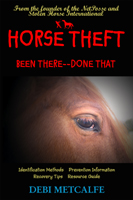 |
|
Show Horse Promotions Mary Murray
|
A COP'S POINT OF VIEW
|
||||||
|
Debi Metcalfe ~ Stolen Horse International, Inc. ...powered by NetPosse Volunteers! "Never underestimate the power of one." http://www.netposse.com/ Cops like nothing better than to recover people's stolen property and find suspects. Unfortunately, though, people often add to a cop's workload by actually helping thieves steal their property. How? The property isn't marked or positively identifiable. Horse theft has become big business. Why? It's easy and there is minor risk to the thief. Take a look at the horses you know. How many of them are marked or branded so that their owner can positively identify them? It's a major problem for law enforcement officers to track property that isn't clearly and unmistakably marked. How does the officer know the right horse has been located? It's surprising to many citizens to learn that law enforcement officers can't just go onto a person's property and 'take a look' when we get vague reports of an animal that 'might' be the stolen horse. Just comparing a picture of the stolen horse to the actual animal might not be enough to return the horse to its owner. Many other elements must be considered. The responsibility falls to the owners to provide absolute proof that the horse belongs to them. In recent cases involving horses, I have found that owners do not have their horses marked at all, or they have only marked them in one way. Several widely-acceptable methods are available: branding and/or freeze marking, microchipping, and tattooing. Microchipping is great, but don't stop there. Average cops don't have portable scanners to detect the chip. Tattoos are also useful, but what if the law enforcement officer doesn't know where to look for the tattoo? My personal opinion is to mark your animal in at least two ways. Think about it this way: If there are two horses in a pasture, and one of them is clearly branded, which one do you think a thief is going to take? Thieves are only interested in financial gain and avoiding capture. The branded, identifiable horse is undesirable to a thief hoping to get some quick cash. Take pictures of your horse from all four sides. Take close-ups of identifying marks and anything that can help identify your animal. Further protect your horse by a freeze mark or brand. Let's say I'm on patrol, and I stop a truck pulling a livestock trailer. If I see a brand on a horse and have received information from the crime computer or a radio broadcast about a particular brand, and there's a picture of it, I'm going to take a closer look. But the brand alone might not be enough to take the animal. However, if I know there's a tattooed number on the upper lip and that also matches, those two elements give me a whole new ball game. Now we might just have a happy ending. The horse goes back to the owner and the criminals go where they belong! Today, the average value of a horse exceeds most states' limit for felony property crimes. That means the act of stealing a horse constitutes a felony crime. Many states will enter a horse's tattoo number into their criminal computers. That means a cop of the street can radio in a tattoo number (which is treated like a serial number) and learn that the horse has been stolen from several states away. Naturally, there are downsides to every system of marking horses. Tattoos can be removed and brands can be altered. That's why I stress the importance of using at least two methods to mark your horse. You have a better chance finding your animal if it is lost or stolen. No, our system isn't perfect. Criminals are always looking for ways to beat the system. But you, the citizen, must bear some of the blame for their success. If your car is stolen, you can provide the vehicle identification number or the license plate number to the authorities. If your wallet or purse is stolen, you can tell the police your Social Security number or date of birth. These are positive means of identification. How are your animals identified? I often hear that some people have the opinion that cops don't care about stolen animals. That might be true in some places. But, when they do care, if you've taken no precautions to protect your animals, is it the cops' fault if your animal isn't recovered? Cops can't just wave a magic wand and find your horse. Take the steps necessary provide us the information we need to do our jobs. Law enforcement officers are professionals. We know our laws and the standards we must meet for recovering animals, but you need to help by giving us the tools to do our job. If you see a picture and call us to say "Hey, that's my horse," do you think that is enough for us to give it back to you? Sorry, folks, but it isn't, under most states' standards. You must prove it is your property or we must prove it for you. That job is easier and more effective if you have given us tools to work with. Just saying "That's mine" doesn't work anymore. Sometimes when animals are stolen, they are moved great distances from home. This makes recovery even harder without the proper tools. So, what I am suggesting is do your part. Make sure you are within in the law of your home state for whatever kind of marking process you choose. Some states may be different branding regulations. Contact your State Department of Agriculture to ensure you follow the proper guidelines for branding or freeze marking your horses. Or, contact the Federal Department of Agriculture for assistance if need be. Whichever way you choose, be sure to do something. People don't realize how many laws can affect them with their animals. My next suggestion is learn the laws of your state as they apply to you and your animals. I'll have more comments on this topic at a later date. For now, take these steps:
I hope you all find these comments helpful in some way. I wish you many pleasant days with your horses. Ride straight, and safe travels, THE HORSE SOLDIER
© 2000 - 2010 Show Horse Promotions The Show Horse Promotions web site is an informational web site, this information is subject to change without notice. Any use of, or actions taken based upon any of the information contained on this web site is done entirely at your own risk. Show Horse Promotions expressly prohibit you from republishing or redistributing this content without first receiving our written consent. By using this site, you agree not to hold us liable for any errors or delays in this content, or for any actions that you take in reliance thereon. This site contains links to other Internet sites. These links are not endorsements by us of any products or services in those sites, and we have not endorsed or approved any information in those sites. |
||||||
|
||||||||

